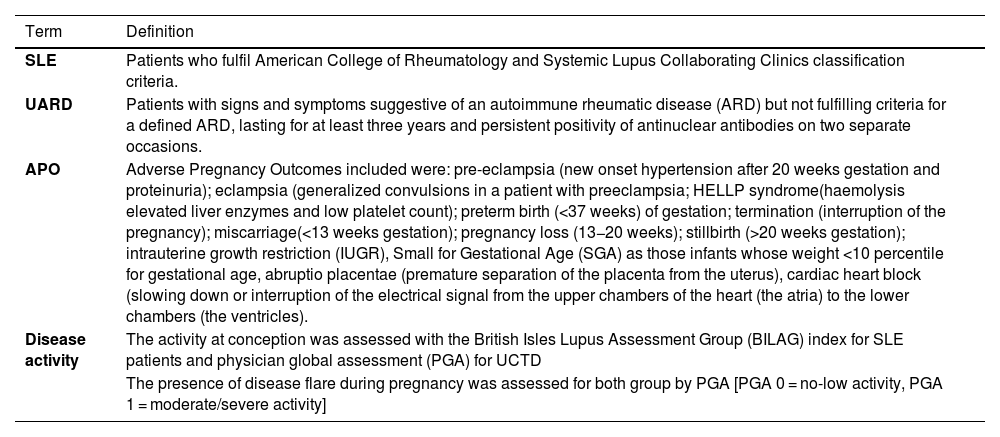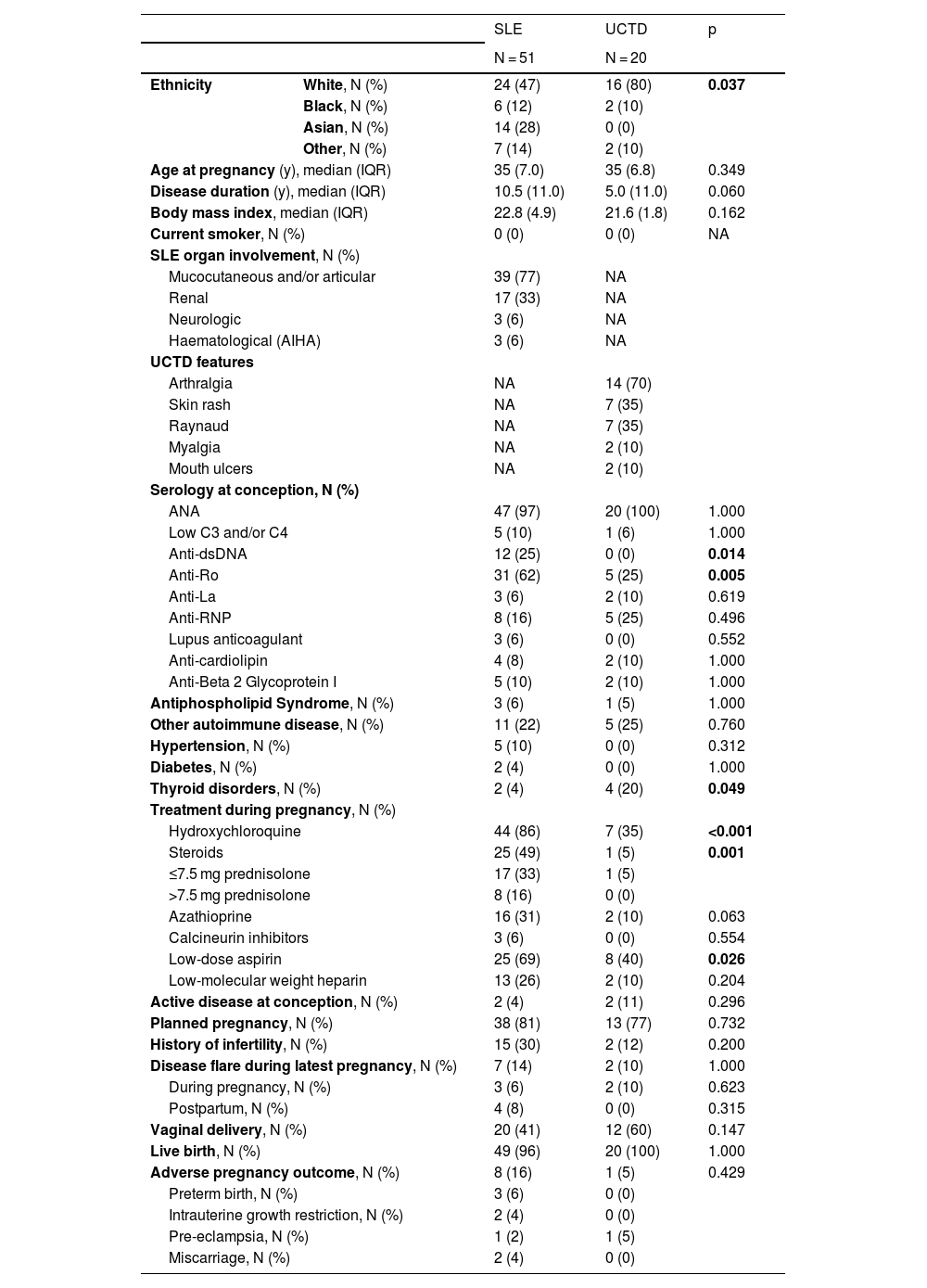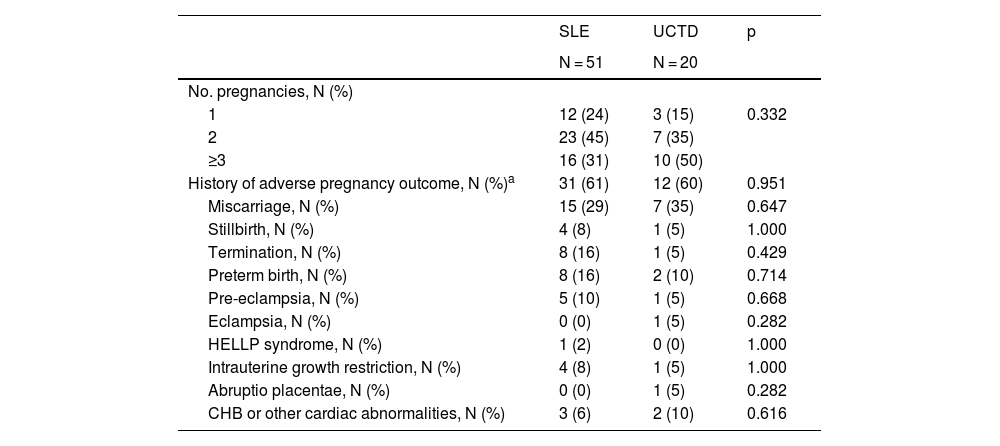Females diagnosed with systemic lupus erythematosus (SLE) face an elevated risk of adverse pregnancy outcomes (APOs). However, the evidence regarding whether a similar association exists in patients with undifferentiated connective tissue disease (UCTD) is inconclusive.
MethodsWe conducted a retrospective review (2006–2019) of pregnancy outcomes among patients with SLE (n = 51) and UCTD (n = 20) within our institution. We examined the occurrence of various APOs, encompassing miscarriage, stillbirth, termination, preterm birth, pre-eclampsia, eclampsia, HELLP syndrome, intrauterine growth restriction, abruption placentae, congenital heart block, or other cardiac abnormalities.
ResultsThe mean age at pregnancy was 35 ± 7.0 years for patients with SLE and 35 ± 6.8 years for those with UCTD (p = 0.349). The proportion of Caucasian women was 47% in SLE and 80% in UCTD. Pregnancies in both groups were planned (81% in SLE and 77% in UCTD), and patients presented with inactive disease at conception (96% in SLE and 89% in UCTD). Hydroxychloroquine at conception was utilized by 86% of women with SLE, in contrast to 36% in the UCTD group. Both, SLE and UCTD cohorts exhibited low rates of disease flares during pregnancy and/or puerperium (14% vs. 10%). The incidence of APOs was 15.6% in SLE patients compared to 5% in those with UCTD (Risk difference 19.5%; 95% confidence interval: −3.9 to 43.1; p = 0.4237).
ConclusionOur study underscores the importance of strategic pregnancy planning and the maintenance of appropriate treatment throughout pregnancy to ensure optimal disease management and minimize adverse outcomes in both SLE and UCTD pregnancies.
Las mujeres con lupus eritematoso sistémico (LES) presentan un riesgo elevado de resultados adversos en el embarazo (APO). Sin embargo, la evidencia científica es inconclusa si este riesgo también existe en pacientes con enfermedad del tejido conectivo no diferenciada (UCTD).
MétodosRealizamos una revisión retrospectiva (2006–2019) de los resultados del embarazo entre pacientes con LES (n = 51) y UCTD (n = 20. Examinamos la ocurrencia de varios APO: aborto espontáneo, mortinato, terminación, parto prematuro, preeclampsia, eclampsia, síndrome HELLP, restricción del crecimiento intrauterino, desprendimiento de placenta, bloqueo cardíaco congénito u otras anomalías cardíacas.
ResultadosLa edad media en el embarazo fue de 35 ± 7.0 años para pacientes con LES y 35 ± 6.8 años para UCTD (p = 0.349). La proporción de mujeres caucásicas fue del 47% en LES y del 80% en UCTD. Los embarazos fueron mayoritariamente planificados (81% en LES y 77% en UCTD), y la enfermedad inactiva en la concepción (96% en LES y 89% en UCTD). La hidroxicloroquina en la concepción fue utilizada por el 86% en pacientes con LES vs. 36% en UCTD. Tanto las cohortes de LES como de UCTD presentaron tasas bajas de brotes de la enfermedad durante el embarazo y/o puerperio (14% vs 10%). La incidencia de APO fue del 15.6% en LES vs. el 5% en UCTD (Diferencia de riesgo 19.5%; Intervalo de Confianza del 95%: -3.9 a 43.1; p = 0.4237).
ConclusiónNuestro estudio subraya la importancia una correcta planificación y mantenimiento del tratamiento adecuado durante el embarazo para minimizar el riesgo de APO en ambos grupos.
Article
Diríjase desde aquí a la web de la >>>FESEMI<<< e inicie sesión mediante el formulario que se encuentra en la barra superior, pulsando sobre el candado.

Una vez autentificado, en la misma web de FESEMI, en el menú superior, elija la opción deseada.

>>>FESEMI<<<











